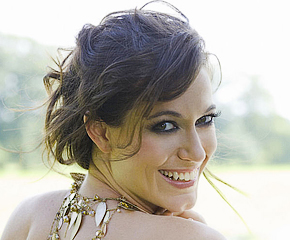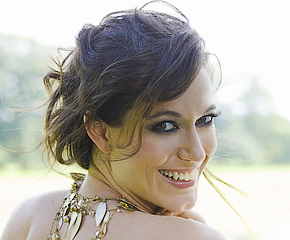
What to make of soprano Kate Royal’s A Lesson in Love: A Story Through Song? The recital, which brought to San Francisco’s Herbst Theatre almost all of the selections on Royal’s eponymous CD release of 2011, purported to tell the story of a young woman’s journey through Waiting, Meeting Mr. Right, Wedding, Betrayal, and Ultimate Resignation. While it did so, more or less, the tale came not without a few curious bumps in the road and an equal amount of half-fulfilling vocal gestures.
This is not to say that Royal is anything but a gorgeous woman with a wonderful instrument. Indeed, she was so beautiful, outfitted in a bright red floor-length dress with a fan of red fabric rising diagonally from the bodice, that it was hard to keep your eyes off her. While she at times didn’t seem to know what to do with her arms, which made too many empty gestures devoid of energy, her ability to move her head to face all sides and tiers of the audience and gaze as if directly into each person’s eyes, was as riveting as the visual conviction she brought to many of her 28 songs.
The Vocal Artistry
At its best, Royal’s instrument is exemplary. By opening with William Bolcom’s “Waitin’” she may have brought too much vibrato to the highest notes of this simple song, but the wedding of her gorgeous voice and expectant gaze spoke volumes. Just as impressive was her ability to transition from the intentionally naïve tone and visage of the little girl singing Hugo Wolf’s “Die Kleine” to, in the very next song, the weightier and more mature tone of the deeper feeling young woman in Franz Liszt’s “Es muß ein Wunderbares sein” (There must be something wonderful). As to how the girl grew up so quickly, with little space between songs, well, that’s opera.
What was less than fulfilling was Royal’s tendency to lose focus at the top of her range unless singing at full volume, and to render numerous climaxes in a less than climactic manner. When I first encountered her artistry, on her 2007 debut recital with orchestra, I thought that EMI’s engineers had recorded her at a hot level that caused some of her high notes to distort. In Herbst, I discovered instead that they are often surrounded by a slightly buzzing fuzz that lessens their emotional impact.
To be sure, there were countless moments of ravishing vocalism. One came at the close of Claude Debussy’s “Apparition,” where Royal’s high floated note perfectly captured “a snow of white bouquets of fragrant stars.” Others came in Francesco Paolo Tosti’s “Pour un baiser,” where Royal was simply exquisite, and Henri Duparc’s unforgettable “Extase” (Ecstasy). If only she had sung slower, and “died” a little more in a song where the word mort (death) and the vocal silence during the expressive piano interlude signify the ecstasy beyond words that follows lovemaking.
But there were other songs where ravishing tone missed the point. Franz Schubert’s “Du liebst mich nicht” (You don’t love me) calls for hollow sounds of emotional emptiness, and Benjamin Britten’s arrangement of “O Waly Waly” for an all-pervasive sadness that cannot be expressed by simply eliminating vibrato on the word cold. (The song was also sung too fast.) Wolf’s “Verschling’ der Abgrund” (May my lover’s house be engulfed) called for a level of vehemence that Royal simply could not muster. Suffering is not her strong suit.
It is fair to say that Royal was at her best in songs that either expressed the naiveté of youth or the gentle sadness of resignation. Her penultimate song, Herbert Hughes’ “I will walk with my love,” and the second verse of her sole encore, “Danny Boy,” were as ravishingly vocalized as they come. (The first verse of “Danny Boy,” however, was marred by another of those fuzzy highs on a note that, when all is said and done, is not very high.)
Paradoxically, those two performances also highlighted another of Royal’s shortcomings. When singing in English, her sympathetic response to text frequently led her to slow down and linger when words and music invited such. But in other languages, and even at the end of Aaron Copland’s English language “Pastorale,” too many opportunities for expression were sacrificed to unbending straight time. A case in point was the close of Reynaldo Hahn’s “Infidélité,” where slowing down would have taken the song to the next level.
Curios and Curiosities
Royal and Martineau clearly put a lot of work into A Lesson in Love, and came up with quite a few rarely heard selections. But their decision to move quickly from song to song shortchanged the most intense of the bunch. Ideally we should be catching our breath after Schubert’s great “Gretchen am Spinnrade” (Gretchen at the Spinning Wheel) before getting so caught up in the emotional churning of “Rastlose Liebe” (Restless Love) that poor Gretchen gets left by the wayside.
Even more disturbing was how Royal mis-used a few of the songs. The aforementioned “Gretchen” was treated as a song of enraptured longing rather than of despair. (Listen to Elisabeth Schwarzkopf with Edwin Fischer to hear what was lost.) Maurice Ravel’s “Chanson de la mariée” (Wedding Song) was performed with strange ferocity, and Schubert’s “Die Männer sind méchant” (Men are wicked) with none of the mocking humor conveyed by the admittedly unsympathetic composer’s strophic accompaniment.
Martineau, as expected, played wonderfully, but his gifts were shortchanged by a half-opened piano that dimmed his light. Nor could he fully express what a song has to offer when his soprano was not there. He can bubble along like the best of them, but upstaging is not something this supreme accompanist even remotely entertains.
There were many beautiful moments in Royal’s recital, some of which extended through entire songs. Had these been gathered together in a different program, the recital would have been an unqualified success. As it was, the recital made clear that are still lessons to be learned.

